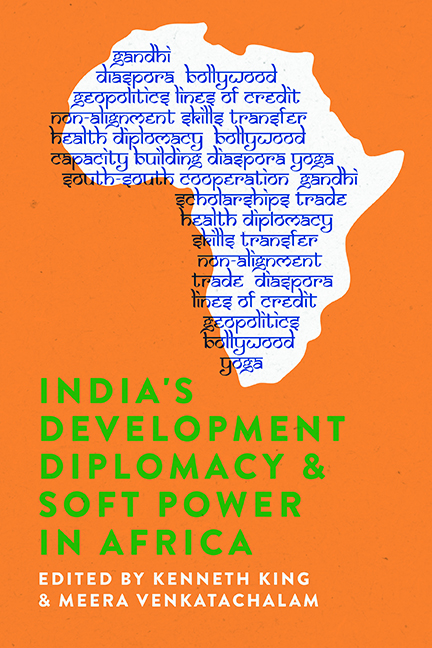Book contents
- Frontmatter
- Contents
- Notes on Contributors
- Acknowledgements
- List of Abbreviations
- Glossary
- Introduction: India–Africa Now: Changing Imaginaries and Knowledge Paradigms
- Part 1 The Geopolitical Imaginary and Soft Power
- Part 2 The Indian Political Right and the Reconfiguration of Soft Power in Africa
- Part 3 Capacity Building: Shifting Modalities and New Knowledgescapes
- Part 4 Skilling, Knowledge Transfer and Indo-African Interactions
- Conclusion: Reflections on India–Africa Studies, Development Cooperation and Soft Power
- Index
3 - The Indian Political Right, Soft Power and the Reimagining of Africa
Published online by Cambridge University Press: 26 May 2022
- Frontmatter
- Contents
- Notes on Contributors
- Acknowledgements
- List of Abbreviations
- Glossary
- Introduction: India–Africa Now: Changing Imaginaries and Knowledge Paradigms
- Part 1 The Geopolitical Imaginary and Soft Power
- Part 2 The Indian Political Right and the Reconfiguration of Soft Power in Africa
- Part 3 Capacity Building: Shifting Modalities and New Knowledgescapes
- Part 4 Skilling, Knowledge Transfer and Indo-African Interactions
- Conclusion: Reflections on India–Africa Studies, Development Cooperation and Soft Power
- Index
Summary
Indian state and non-state actors, from the Nehruvian to the Modi eras, have used similar cultural resources in their deployment of soft power in Africa, from yoga to Bollywood (Shangwe, this volume). They have also emphasised as India's strengths a value system based on political pluralism, diversity and non-violence (Blarel 2012: 29), virtues sometimes embodied through the figure of Mahatma Gandhi (Vittorini, this volume). The gradual rise of the right-wing BJP in India has coincided with the dethroning of the Nehruvian vision of the nation as a secular, multi-faith, pluralistic society. Along with this broader shift, India's normative agenda, which defines intrinsic value systems developed by the nation, and its place and role on the global stage has also changed (Hall 2017). A reinvention of Indian culture and reconceptualisation of the nation's past civilisational role in the world has ensued, which is changing the rationale for India's engagement with Africa – against the backdrop of the BJP's ‘Hindutva’ ideology. This chapter seeks to illustrate how ideas derived from Hindutva define the cognitive frames which inform understandings of certain elements of Indian soft power in Africa. These ideas are contributing to the redrawing of India's normative agenda on the global stage, and also reconfiguring the India–Africa relationship from one governed by southern, postcolonial solidarity to a more hierarchical relationship.
Hindutva and its tenets
Hindutva (translation: Hinduness) itself is not a coherent ideology, but a curious blend of Hindu cultural nationalism of the colonial era; ideas from nineteenth century revivalist Hindu movements, and pseudo-scientific notions of race and eugenics developed by regimes on the brink of the Second World War in Europe. The ruling BJP and a number of other socio-cultural organisations and political parties – such as the Rashtriya Swayamsevak Sangh (RSS), Vishva Hindu Parishad (VHP), Bajrang Dal (BD) and Hindu Mahasabha (HM), among others – are collectively organised into the Sangh Parivar (family of organisations) that broadly subscribes to the ideology of Hindutva. Its adherents largely conceive of India as a Hindu civilisational nation, which they believe developed a unique moral, socio-economic and technological order (Bajpai 2014: 131). The ‘founding fathers’ of Hindutva, Vinayak Damodar Savarkar (1883–1966) and Madhav Sadashiv Golwalkar (1906–73), argued that Hindu India had fallen in stature due to centuries of subjugation by Muslim and Christian powers.
- Type
- Chapter
- Information
- India's Development Diplomacy and Soft Power in Africa , pp. 59 - 78Publisher: Boydell & BrewerPrint publication year: 2021



